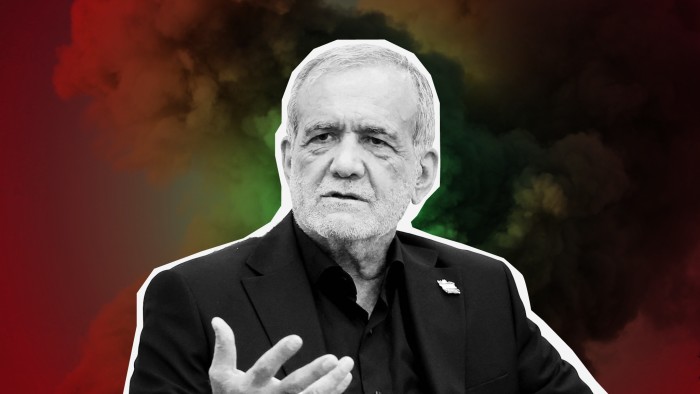Stay informed with free updates
Simply sign up to the Middle Eastern politics & society myFT Digest — delivered directly to your inbox.
Iranian hardliners have reignited a bitter power struggle with reformist politicians as the aftermath of the country’s 12-day war with Israel provokes a fierce contest over the future of the theocracy.
Iran’s setbacks at the hands of Israel and the US, whose campaigns last month killed senior military commanders and largely destroyed the country’s nuclear facilities, have in recent days fuelled recriminations and rancorous debate within the Islamic republic.
Hardline ideologues, who advocate for perennial enmity with the west, have railed against the possibility of re-engaging with the US and attacked Iran’s reformist president Masoud Pezeshkian, who this week suggested he remained amenable to negotiations with Washington.
“We still believe the window for diplomacy is open and we’ll seriously pursue this peaceful path,” Pezeshkian wrote on X on Monday. Reformists argue that the Islamic republic can only survive by doubling down on diplomacy, relaxing its ideological strictures and opening up its economy.
The president provoked outrage from hardline lawmakers last week after he sought to play down the regime slogan “Death to America” in an interview with conservative media personality Tucker Carlson.
Pezeshkian claimed the phrase, a hallmark of state rallies since the 1979 Islamic Revolution, was not meant to be taken literally.
Some two dozen hardline members of parliament later wrote to the president to criticise him, with MP Amir Hossein Sabeti warning of a “parliamentary shift of approach” if the government does not change course, which some observers interpreted as a tacit impeachment threat.
“I was horrified,” Abolfazl Zohrevand, a prominent hardline MP, told local media last week of Pezeshkian’s comments. The president “lacks the minimum qualifications for this position . . . and whitewashed the US. We have concluded that the main task of the government is to put an end to the Islamic Revolution.”
Iran had engaged in several rounds of talks with the US over the country’s nuclear programme before Israel launched its surprise attack, which Washington later joined before brokering a fragile ceasefire on June 24.
The assault, which officials say killed more than 1,000 people, mostly civilians, helped reawaken a sense of nationalism as Iranians rallied around the flag.
But hardliners, who remained largely silent during the conflict in the interests of national cohesion, have since argued that the war has vindicated their opposition to talks — and showed that more diplomacy will not prevent future American or Israeli attacks.
“Now, more than ever, this confrontation with the US and Israel reinforced our discourse that this hostility, rooted in our religion, should be the measure of right and wrong,” said Hamid-Reza Taraghi, a hardline politician. “It’s the reformists whose arguments and support for talks with the US have lost credibility.”

Reformists fear that provocations from hardliners could invite more foreign aggression, with one cleric on state-affiliated television using a fatwa to launch a fundraising campaign offering a bounty on US President Donald Trump.
“Hardliners offer no way forward and lack public support,” said reformist analyst Saeed Laylaz. “Their main concern isn’t ideology. It’s being left out of any future US agreement.”
Iran’s top diplomats continue to insist, as they did before the war, that Tehran will not compromise on its demand that it continue enriching uranium domestically as part of any new deal, one of the US’s key positions. Iran says its nuclear programme is peaceful.
But any ultimate decisions on Iran’s postwar strategy are expected to be made by the country’s 86-year-old supreme leader, Ayatollah Ali Khamenei, though he has largely retreated from public view since the conflict.
Reformists, however, have sought not just to influence foreign relations — but seek sweeping changes at home.
Around 200 economists and former reformist officials last week issued a statement calling for “a shift in the paradigm of governance”, urging Pezeshkian’s administration to pursue diplomacy with the US and Europe, revise financial policies and combat corruption to restore public trust.
Mir-Hossein Moussavi, a former prime minister who has been under house arrest since 2011, also called for a national referendum to establish a constitutional parliament and begin a political transition.
But there is no indication that Iran’s power centres, particularly the Islamic Revolutionary Guard Corps — the country’s most powerful institution — will allow him a role in shaping the future. Mostafa Tajzadeh, another senior political prisoner, was abruptly handed new sentences last week that will keep him in jail until 2032.
“People seem to be waiting to see what happens in this internal power struggle,” said Karim, a food merchant in Tehran, who did not want to use his second name. “But politicians may not realise time is running out and they need to make up their minds very fast.”
Source link









